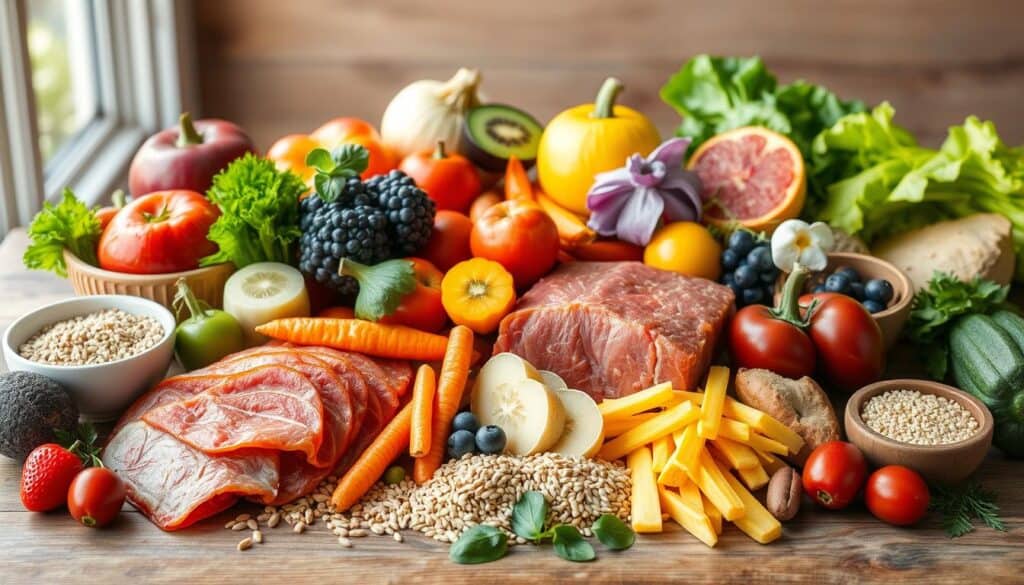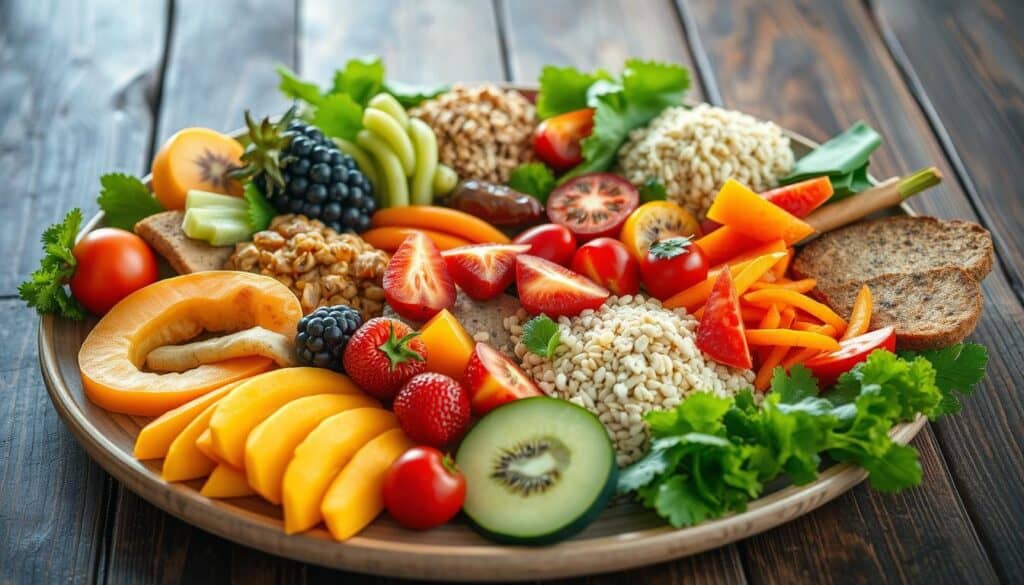Simple Recipes for a Balanced Diet
This post may contain affiliate links. As an Amazon Associate, I earn from qualifying purchases. If you click and buy, we may earn a small commission at no extra cost to you. Learn more.
Achieving a balanced diet is essential for maintaining optimal health and energy levels. In this article, we’ll explore easy-to-make, nutritious recipes that support a balanced approach to eating. We’ll cover the fundamentals of balanced nutrition, its numerous benefits, and provide delectable meal ideas for breakfast, lunch, dinner, and snacks. By incorporating these wholesome recipes into your daily routine, you’ll learn how to prepare satisfying, balanced meals that nourish your body and mind.
Contents
- 1 Understanding a Balanced Diet
- 2 Benefits of a Balanced Diet
- 3 Key Components of Balanced Meals
- 4 Delicious Breakfast Ideas
- 5 Satisfying Lunch Suggestions
- 6 Nutritious Dinner Recipes
- 7 Wholesome Snacks to Keep You Energized
- 8 Tips for Maintaining a Balanced Diet
- 9 Conclusion: Embracing a Balanced Diet
- 10 FAQ
Key Takeaways
- Discover simple, balanced recipes to incorporate into your daily routine
- Understand the key components of a balanced diet and their importance
- Learn about the numerous benefits of a balanced diet, including improved energy, mood, and weight management
- Explore a variety of delicious breakfast, lunch, dinner, and snack options that support a balanced approach to eating
- Gain tips for maintaining a balanced diet, including meal planning, hydration, and incorporating variety
Understanding a Balanced Diet
Achieving a balanced diet is essential for maintaining optimal health and well-being. A balanced diet encompasses a variety of foods from all the major food groups, providing the necessary nutrients in the right proportions. Let’s explore the key components of a balanced diet and understand the importance of proper nutrition and portion control.
What Constitutes a Balanced Diet?
A balanced diet typically includes the following food groups:
- Fruits and vegetables: These provide essential vitamins, minerals, and dietary fiber.
- Whole grains: Whole grains are a good source of complex carbohydrates, fiber, and B vitamins.
- Lean proteins: Lean proteins, such as poultry, fish, beans, and legumes, support muscle growth and repair.
- Healthy fats: Healthy fats, like those found in nuts, seeds, and avocados, are important for brain health and energy.
- Dairy or dairy alternatives: Dairy products or their plant-based alternatives are a valuable source of calcium and other nutrients.
Nutrients You Need Daily
To maintain a balanced diet, it’s essential to consume the right amount of macronutrients (protein, carbohydrates, and fats) and micronutrients (vitamins and minerals) each day. The recommended daily intake of these nutrients varies based on factors like age, gender, and activity level. Consulting a healthcare professional or a registered dietitian can help you determine your personalized nutritional needs.
Importance of Portion Control
Alongside the right combination of foods, portion control plays a crucial role in maintaining a balanced diet. Consuming the appropriate serving size for each food group helps ensure that you’re getting the right amount of calories and nutrients. Paying attention to portion sizes can also prevent overeating, which can lead to weight gain and other health issues.
By understanding the elements of a balanced diet and incorporating the right nutrient-dense foods in the proper portions, you can take steps towards a healthier lifestyle and improved overall well-being.
Benefits of a Balanced Diet
Adopting a balanced diet can unlock a myriad of benefits for your overall well-being. By nourishing your body with the right combination of nutrients, you’ll experience a surge in energy levels, enhanced mood and mental health, and better weight management – all of which can profoundly improve your quality of life.
Improved Energy Levels
A balanced diet rich in complex carbohydrates, lean proteins, and healthy fats provides your body with a steady supply of energy throughout the day. This sustained energy can help you tackle your daily tasks with increased focus and productivity, leaving you feeling more alert and invigorated.
Enhanced Mood and Mental Health
The connection between nutrition and mental well-being is well-documented. A balanced diet that includes essential vitamins, minerals, and antioxidants can help regulate neurotransmitters, reducing the risk of mood disorders and supporting cognitive function. Proper nutrition can also alleviate symptoms of anxiety and depression, leaving you feeling more positive and resilient.
Better Weight Management
A balanced diet that emphasizes nutrient-dense foods and portion control can be a powerful tool in achieving and maintaining a healthy weight. By fueling your body with the right nutrients, you’ll be less likely to experience cravings or energy crashes, making it easier to make healthy choices and sustain long-term weight management.
“Eating a balanced diet is not just about weight – it’s about nourishing your body and mind for optimal health and well-being.”
Incorporating a balanced diet into your lifestyle can have a transformative impact on your physical, mental, and emotional well-being. By prioritizing proper nutrition, you can unlock a world of benefits and feel empowered to live your best life.
Key Components of Balanced Meals
Constructing a balanced diet is essential for optimal health and well-being. To achieve this, it’s crucial to understand the crucial macronutrients that form the foundation of a nutritious meal: proteins, healthy fats, and carbohydrates. Let’s explore the role these key components play in maintaining a balanced diet.
Proteins: The Building Blocks
Proteins are the building blocks of our body, responsible for the growth, repair, and maintenance of tissues. They are essential for muscle development, immune function, and numerous other physiological processes. Incorporating a variety of protein-rich foods, such as lean meats, poultry, fish, eggs, legumes, and dairy products, can help ensure you meet your daily protein needs.
Healthy Fats: Nourishment for the Body
Contrary to popular belief, healthy fats are vital for maintaining overall health. They support brain function, hormone production, and nutrient absorption, among other crucial roles. Opt for sources of monounsaturated and polyunsaturated fats, such as avocados, nuts, seeds, and fatty fish, to ensure your body receives the nourishment it needs.
Carbohydrates: Your Energy Source
Carbohydrates are the primary source of energy for our bodies. They fuel our muscles, brain, and various other organs, enabling us to function at our best. Whole, fiber-rich carbohydrates, like whole grains, fruits, and vegetables, should be the focus of a balanced diet, as they provide sustained energy and promote overall well-being.
By understanding the roles of these macronutrients and incorporating them into your meals, you can create a balanced diet that supports your health and vitality. Remember, balance is key – no single nutrient should dominate your plate. Strive for a variety of nutrient-dense foods to ensure your body receives the nourishment it needs to thrive.
Delicious Breakfast Ideas
Kickstart your day with a balanced diet by indulging in these simple and nutritious breakfast recipes. These easy-to-prepare meals not only provide essential nutrients but also help you maintain energy levels throughout the morning.
Overnight Oats with Fresh Fruit
Overnight oats are a convenient and healthy breakfast option. Combine rolled oats, milk or plant-based milk, and your choice of fresh fruit, such as berries or sliced bananas. Let the mixture sit in the refrigerator overnight, and you’ll have a delicious and wholesome meal waiting for you in the morning.
Veggie Omelette with Whole Grain Toast
Start your day with a protein-packed veggie omelette. Sauté a variety of fresh vegetables, such as spinach, bell peppers, and onions, and fold them into lightly beaten eggs. Serve your omelette with a slice of whole grain toast for a balanced and satisfying breakfast.
Greek Yogurt Parfait
Layer Greek yogurt, fresh or frozen berries, and a sprinkle of granola or chopped nuts in a glass or bowl for a nutrient-dense and delightful parfait. This breakfast option is not only delicious but also provides a good source of protein, fiber, and essential vitamins and minerals.
Incorporating these simple yet nutritious breakfast ideas into your routine can help you maintain a balanced diet and set the tone for a productive and energized day ahead.
Satisfying Lunch Suggestions
Lunchtime is a crucial part of a balanced diet. Crafting a well-rounded, nutritious midday meal can provide the energy and nourishment you need to power through the rest of your day. Here are some delicious and satisfying lunch ideas that incorporate a variety of healthy food groups.
Quinoa Salad with Chickpeas and Veggies
Start your lunch with a flavorful quinoa salad packed with protein-rich chickpeas and a colorful array of fresh vegetables. The combination of complex carbohydrates, fiber, and essential nutrients will keep you feeling full and energized until your next meal.
Turkey Wrap with Avocado and Spinach
For a portable and satisfying lunch, opt for a turkey wrap filled with creamy avocado and nutrient-dense spinach. The lean protein from the turkey, healthy fats from the avocado, and a variety of vitamins and minerals from the greens create a well-balanced and delicious midday meal.
Lentil Soup with a Side Salad
A warm and comforting lentil soup paired with a fresh side salad is a nourishing and satisfying lunch option. Lentils provide plant-based protein, while the salad adds a variety of vegetables and healthy fats to ensure you’re getting a complete and balanced meal.
“Eating a balanced diet is not about deprivation, but rather about nourishing your body with a variety of wholesome, satisfying foods.”
Nutritious Dinner Recipes
Preparing a balanced, nutritious dinner is a crucial step towards maintaining a healthy lifestyle. These recipes not only satisfy your taste buds but also provide your body with the essential nutrients it needs to thrive. By incorporating a variety of proteins, complex carbohydrates, and fresh vegetables, you can create flavorful and well-rounded meals that support your balanced diet.
Grilled Salmon with Asparagus
Grilled salmon is a fantastic choice for a nutrient-dense dinner. Rich in omega-3 fatty acids, this fish provides a valuable boost of healthy fats. Pairing it with roasted asparagus, a low-calorie vegetable packed with fiber, vitamins, and minerals, creates a delightful and balanced meal. Seasoned with lemon, garlic, and a touch of olive oil, this dish is both delicious and nutritious.
Stir-Fried Tofu with Mixed Vegetables
For a meatless dinner option, try a stir-fry featuring tofu and a variety of fresh vegetables. Tofu is an excellent source of plant-based protein, while the mix of colorful veggies, such as bell peppers, broccoli, and mushrooms, provides a wealth of essential vitamins, minerals, and antioxidants. Stir-frying these ingredients in a flavorful sauce made with soy sauce, ginger, and garlic creates a balanced, nutrient-rich meal.
Whole Wheat Pasta with Marinara and Spinach
Whole wheat pasta, when combined with a homemade marinara sauce and fresh spinach, makes for a nourishing and satisfying dinner. The complex carbohydrates in the whole wheat pasta provide sustained energy, while the spinach adds a boost of vitamins, minerals, and fiber. The tangy and savory marinara sauce ties the dish together, creating a balanced and flavorful meal.
Incorporating these nutritious dinner recipes into your weekly meal planning can help you maintain a balanced diet and support your overall health and well-being. By focusing on whole, unprocessed ingredients and a variety of macronutrients, you can enjoy delicious meals that fuel your body and mind.
“Eating a balanced diet is not about deprivation, but about nourishing your body with the right mix of nutrients.”
Wholesome Snacks to Keep You Energized
Maintaining a balanced diet is essential for overall health and well-being, but it’s equally important to have wholesome snacks on hand to curb cravings and sustain your energy levels throughout the day. Incorporating nutrient-dense, satisfying snacks into your routine can support your nutrition goals without sacrificing taste or convenience.
Hummus with Carrot and Celery Sticks
Creamy, protein-packed hummus paired with crisp carrot and celery sticks makes for a nourishing and delightful snack. The combination of fiber, healthy fats, and complex carbohydrates will keep you feeling full and energized between meals.
Mixed Nuts and Dried Fruits
A handful of mixed nuts, such as almonds, walnuts, and cashews, combined with dried fruits like apricots, cranberries, or raisins, provides a satisfying and nutrient-dense snack. The healthy fats, protein, and natural sugars in this mix will give you a sustained energy boost.
Whole Grain Popcorn with a Twist
Swap out the traditional salty, buttery popcorn for a healthier, whole grain version. Top it with a sprinkle of parmesan cheese, a dash of garlic powder, or a drizzle of honey for a delicious and crunchy snack that won’t derail your balanced diet.
Incorporating these wholesome snack options into your routine can help you maintain steady energy levels, curb cravings, and support your overall balanced diet and healthy eating goals. Remember, prioritizing nutrition through balanced and nourishing choices is key to feeling your best.
Tips for Maintaining a Balanced Diet
Maintaining a balanced diet is a journey, not a destination. It requires consistent effort and a willingness to adapt. Here are some practical tips to help you stay on track and make healthy eating a sustainable lifestyle choice.
Meal Planning and Prepping
One of the keys to maintaining a balanced diet is to plan your meals and prepare them in advance. This helps you stay organized, avoid impulse decisions, and ensure you have healthy options readily available. Set aside time each week to plan your meals, create a grocery list, and prepare components of your meals ahead of time.
Staying Hydrated
Proper hydration is essential for maintaining a balanced diet. Water helps regulate your body’s systems, aids in digestion, and can even support weight management. Aim to drink at least eight glasses of water per day, and consider incorporating hydrating fruits and vegetables into your meals.
Incorporating Variety in Your Diet
- Eating the same foods repeatedly can lead to boredom and a lack of nutritional diversity. Strive to incorporate a variety of balanced diet components, such as different protein sources, colorful fruits and vegetables, and whole grains.
- Experiment with new recipes and cuisines to keep your healthy eating routine interesting and enjoyable.
- Variety not only adds flavor and excitement to your meals but also ensures you’re getting a wide range of essential nutrients your body needs.
Remember, a balanced diet is not a one-size-fits-all approach. What works for one person may not work for another. Be patient with yourself, listen to your body, and make adjustments as needed to find a balanced diet that truly nourishes you.
“The key to a balanced diet is not deprivation, but moderation and variety.”
Conclusion: Embracing a Balanced Diet
As you embark on your journey to a healthier, more balanced diet, it’s important to remember that change doesn’t happen overnight. Start small by incorporating incremental adjustments to your eating habits, whether it’s swapping out a sugary snack for a piece of fruit or adding an extra serving of vegetables to your plate. These small steps can lead to lasting transformations.
Finding What Works for You
Every individual is unique, and what works for one person may not necessarily work for another. Experiment with different meal plans, recipes, and portion sizes to discover the approach that best aligns with your preferences, lifestyle, and nutritional needs. Be patient, and don’t be afraid to make changes along the way.
Enjoying the Process of Eating Well
Embracing a balanced diet should not feel like a chore or a restrictive burden. Instead, view it as an opportunity to explore new, delicious foods, and to nourish your body with the nutrients it craves. Savor the flavors, textures, and aromas of wholesome ingredients, and find joy in the process of preparing and sharing nutritious meals.
FAQ
What is a balanced diet?
A balanced diet is an eating pattern that includes a variety of foods from all the major food groups, providing the right proportions of essential nutrients your body needs for optimal health and functioning.
What are the key components of a balanced diet?
The key components of a balanced diet include proteins, healthy fats, carbohydrates, vitamins, minerals, and fiber. These macronutrients and micronutrients work together to support your overall well-being.
Why is a balanced diet important?
Adopting a balanced diet can provide numerous benefits, such as improved energy levels, enhanced mood and mental health, better weight management, and a reduced risk of chronic diseases. Proper nutrition is essential for maintaining optimal physical and mental health.
How can I ensure I’m getting enough of the essential nutrients?
To ensure you’re meeting your daily nutrient requirements, focus on consuming a variety of nutrient-dense foods, including lean proteins, whole grains, fruits, vegetables, healthy fats, and low-fat dairy products. Paying attention to portion sizes is also crucial for maintaining a balanced diet.
What are some easy-to-make, balanced meal ideas?
Some delicious and balanced meal ideas include overnight oats with fresh fruit for breakfast, a quinoa salad with chickpeas and vegetables for lunch, grilled salmon with asparagus for dinner, and hummus with carrot and celery sticks for a healthy snack.
How can I maintain a balanced diet in the long run?
To sustain a balanced diet long-term, try incorporating strategies like meal planning and prepping, staying hydrated, and adding variety to your meals. Remember to start small with changes and find an approach that works best for your lifestyle and preferences.










